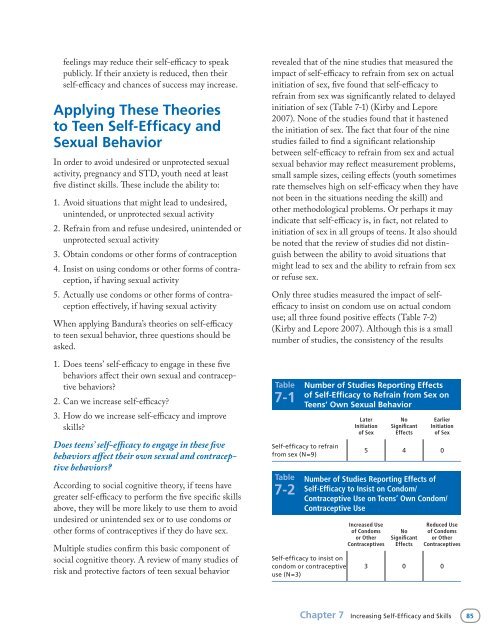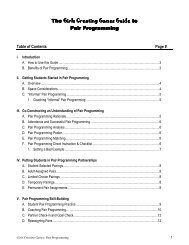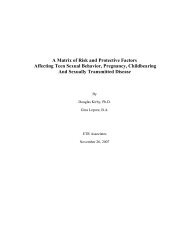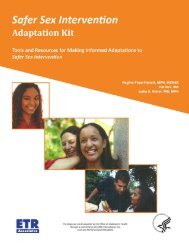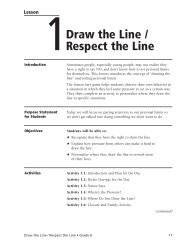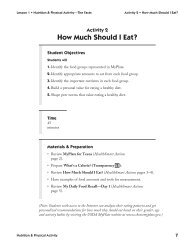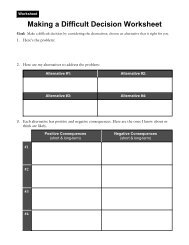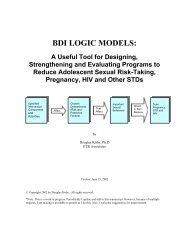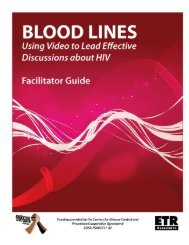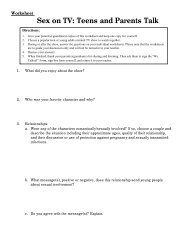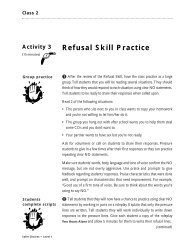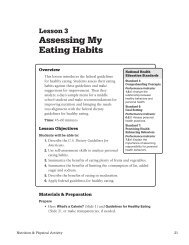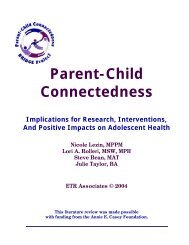persevere, but, nevertheless, ultimately fail. Thus,the task should not be too difficult.Mastery experiences are the most effectiveapproach towards increasing self-efficacy.2. Vicarious Experiences. When people see otherpeople succeed in some sustained effort, thentheir own confidence in succeeding at the samebehavior also is increased. Conversely, if peoplesee others fail, their self-efficacy is diminished.The impact of these vicarious experiences isenhanced when people’s success is acknowledgedfavorably by others. If not acknowledged or ifacknowledged unfavorably, the impact is lesspositive.The impact of these vicarious experiences also isdetermined by the extent to which the observersperceive those people modeling the behavior tobe like themselves. If the observers view thoseengaging in behavior as being very similar tothemselves, the success or failure of those modelingthe behavior will have a greater impact on theobservers’ self-efficacy.Sometimes people’s perceptions of others are notaccurate. They may perceive themselves as similarto someone else who is very skilled at some taskand models behavior well and then they set themselvesup for failure when they cannot perform aswell.When people model successful behavior, they notonly directly increase the self-efficacy of othersby showing that success in some endeavor canbe achieved, they also increase the self-efficacyof others by demonstrating exactly how successcan be achieved—that is, by demonstrating thespecific skills needed to succeed.People also compare their own performances tothose of others. If they perceive they performbetter than others, their efficacy goes up; if theyperceive they perform worse than others, theirefficacy drops.3. Verbal and Social Persuasion. When peopleconvince others verbally that they can achievesomething, then the self-efficacy of the lattergroup is increased.The impact of social persuasion on self-efficacy ishighly related to whether or not mastery occurs.When social persuasion encourages people to tryhard at something and they ultimately succeed,then social persuasion is accompanied by masteryand self-efficacy is especially strengthened. Whensocial persuasion encourages people to try toachieve something, but they fail, then the initialunrealistic boosts in self-efficacy produced by thesocial persuasion are greatly diminished.If social persuasion is negative and discouragespeople from trying very hard and as a resultthey do not try hard and fail, then this negativesocial persuasion may have a particularly negativeimpact on self-efficacy.Given the interaction between social persuasionand either mastery or failure, people trying toincrease self-efficacy should ideally do more thansimply persuade; they also should structure situationsso that the people being persuaded achievemastery and succeed in their efforts. One of manyways to do this is to demonstrate their success bymeasuring and showing their self-improvementrather than exposing them to possible failurethrough competition with others.People trying to persuade others will be moreeffective if they are credible. They may be particularlyeffective if they are a significant other, suchas a friend, family member, partner, or teacher.In addition, if persuaders encourage others to dothings and they succeed, then both the credibilityof the persuaders and the self-efficacy of thosebeing persuaded is enhanced. And, of course, theconverse is true. If persuaders try to convince othersthat they can do something and they fail, thenboth credibility and self-efficacy are diminished.4. Physical and Emotional Reactions. Peoplesometimes have negative physical and emotionalreactions associated with a particular behavior orsituation (e.g., stress or nervousness). These negativereactions may reduce self-efficacy to completethat activity successfully. Improving these physiologicaland emotional responses can improveself-efficacy. For example, people may feel anxietyspeaking in front of others and these negative84 <strong>Reducing</strong> <strong>Adolescent</strong> <strong>Sexual</strong> <strong>Risk</strong>: A <strong>Theoretical</strong> Guide for Developing and Adapting Curriculum-Based Programs
feelings may reduce their self-efficacy to speakpublicly. If their anxiety is reduced, then theirself-efficacy and chances of success may increase.Applying These Theoriesto Teen Self-Efficacy and<strong>Sexual</strong> BehaviorIn order to avoid undesired or unprotected sexualactivity, pregnancy and STD, youth need at leastfive distinct skills. These include the ability to:1. Avoid situations that might lead to undesired,unintended, or unprotected sexual activity2. Refrain from and refuse undesired, unintended orunprotected sexual activity3. Obtain condoms or other forms of contraception4. Insist on using condoms or other forms of contraception,if having sexual activity5. Actually use condoms or other forms of contraceptioneffectively, if having sexual activityWhen applying Bandura’s theories on self-efficacyto teen sexual behavior, three questions should beasked.1. Does teens’ self-efficacy to engage in these fivebehaviors affect their own sexual and contraceptivebehaviors?2. Can we increase self-efficacy?3. How do we increase self-efficacy and improveskills?Does teens’ self-efficacy to engage in these fivebehaviors affect their own sexual and contraceptivebehaviors?According to social cognitive theory, if teens havegreater self-efficacy to perform the five specific skillsabove, they will be more likely to use them to avoidundesired or unintended sex or to use condoms orother forms of contraceptives if they do have sex.Multiple studies confirm this basic component ofsocial cognitive theory. A review of many studies ofrisk and protective factors of teen sexual behaviorrevealed that of the nine studies that measured theimpact of self-efficacy to refrain from sex on actualinitiation of sex, five found that self-efficacy torefrain from sex was significantly related to delayedinitiation of sex (Table 7-1) (Kirby and Lepore2007). None of the studies found that it hastenedthe initiation of sex. The fact that four of the ninestudies failed to find a significant relationshipbetween self-efficacy to refrain from sex and actualsexual behavior may reflect measurement problems,small sample sizes, ceiling effects (youth sometimesrate themselves high on self-efficacy when they havenot been in the situations needing the skill) andother methodological problems. Or perhaps it mayindicate that self-efficacy is, in fact, not related toinitiation of sex in all groups of teens. It also shouldbe noted that the review of studies did not distinguishbetween the ability to avoid situations thatmight lead to sex and the ability to refrain from sexor refuse sex.Only three studies measured the impact of selfefficacyto insist on condom use on actual condomuse; all three found positive effects (Table 7-2)(Kirby and Lepore 2007). Although this is a smallnumber of studies, the consistency of the resultsTable7-1Table7-2Number of Studies Reporting Effectsof Self-Efficacy to Refrain from Sex onTeens’ Own <strong>Sexual</strong> BehaviorSelf-efficacy to refrainfrom sex (N=9)Self-efficacy to insist oncondom or contraceptiveuse (N=3)LaterInitiationof SexNumber of Studies Reporting Effects ofSelf-Efficacy to Insist on Condom/Contraceptive Use on Teens’ Own Condom/Contraceptive UseIncreased Useof Condomsor OtherContraceptivesNoSignificantEffectsNoSignificantEffectsEarlierInitiationof Sex5 4 0Reduced Useof Condomsor OtherContraceptives3 0 0Chapter 7 Increasing Self-Efficacy and Skills 85
- Page 1:
Reducing AdolescentSexual RiskA The
- Page 4 and 5:
ETR Associates (Education, Training
- Page 6 and 7:
AcknowledgmentsThis book evolved ou
- Page 8 and 9:
Activities, Boxes and FiguresActivi
- Page 11 and 12:
1 IntroductionThis book was created
- Page 13 and 14:
• Children of teenage mothers are
- Page 15 and 16:
Table1-2 The 17 Characteristics of
- Page 17:
Each of the following chapters focu
- Page 20 and 21:
“determinants,” “behaviors,
- Page 22 and 23:
model, provide evidence regarding h
- Page 24 and 25:
to avoid unwanted sex and then synt
- Page 26 and 27:
Figure2-3 An Example of a Logic Mod
- Page 28 and 29:
Figure2-3 An Example of a Logic Mod
- Page 30 and 31:
Figure2-3 An Example of a Logic Mod
- Page 32 and 33:
Table2-2Learning Objectives to Redu
- Page 34 and 35:
Table2-2Learning Objectives to Redu
- Page 36 and 37:
Table2-3Learning Objectives to Incr
- Page 38 and 39:
Table2-4Learning Objectives to Incr
- Page 40 and 41:
Table2-6Learning Objectives to Incr
- Page 43 and 44: 3 Increasing KnowledgeKeys to Incre
- Page 45 and 46: Table3-1Number of Studies Reporting
- Page 47 and 48: Box3-1Types of Activities to Increa
- Page 49 and 50: partner does not mind using a condo
- Page 51 and 52: methods more often. For example, th
- Page 53 and 54: 4ImprovingPerceptions of Risks—Bo
- Page 55 and 56: 1. Do teens’ perceptions of risk
- Page 57 and 58: a. Presentations and discussions of
- Page 59 and 60: Table4-5Examples of Items That Have
- Page 61 and 62: Pregnancy Risk Activity and Follow-
- Page 63 and 64: STD Handshake(Continued)Important C
- Page 65 and 66: 5AddressingAttitudes,Values and Bel
- Page 67 and 68: Theories ofAttitude ChangeAttitudes
- Page 69 and 70: Although both quality and quantity
- Page 71 and 72: • When arguments are presented by
- Page 73 and 74: that it is possible to improve thes
- Page 75 and 76: c. Use simulations to demonstrate p
- Page 77 and 78: Table5-4Examples of Survey Items fr
- Page 79 and 80: Table5-4Examples of Survey Items fr
- Page 81 and 82: Activity 5-2Dreams, Goals and Value
- Page 83 and 84: Activity 5-4“Dear Abby”Descript
- Page 85 and 86: 6CorrectingPerceptionsof Peer Norms
- Page 87 and 88: Is there a gap between perceptions
- Page 89 and 90: 3. Use concepts, language, symbols,
- Page 91 and 92: Table6-4Examples of Items That Have
- Page 93: 7 Increasing Self-Efficacy and Skil
- Page 97 and 98: situations more difficult so that t
- Page 99 and 100: paper (e.g., the air should be sque
- Page 101 and 102: Activity 7-1Lines That People Use t
- Page 103 and 104: Situations That May Lead to Unwante
- Page 105 and 106: Roleplaying to Enhance Refusal Skil
- Page 107: Activity 7-5Using Condoms Correctly
- Page 110 and 111: chaperoned, they may not have the o
- Page 112 and 113: attitudes about condoms and contrac
- Page 114 and 115: Activity 8-1Description of Activity
- Page 117 and 118: 9IncreasingParent-ChildCommunicatio
- Page 119 and 120: ehavior may be quite complex (Jacca
- Page 121 and 122: 5. Give students multiple homework
- Page 123 and 124: and the activities suggested prior
- Page 125 and 126: Activity 9-1Description of Activity
- Page 127 and 128: Activity 9-3Human Sexuality Board G
- Page 129 and 130: 10 ConclusionsKeys to Reducing Sexu
- Page 131 and 132: Figure10-1Assessing Factors in Curr
- Page 133 and 134: sexual minority youth and pressure
- Page 135 and 136: Table10-1Instructional Principles I
- Page 137: Table10-1Instructional Principles I
- Page 140 and 141: Incidence The number of new cases o
- Page 143 and 144: ResourcesThree kinds of resources a
- Page 145 and 146:
Science-Based Practices: A Guide fo
- Page 147 and 148:
National Longitudinal Study of Adol
- Page 149 and 150:
Changing Social Normshttp://www.etr
- Page 151 and 152:
Advocates for Youth, Young Women of
- Page 153 and 154:
ReferencesAbelson, R., and Prentice
- Page 155 and 156:
Coyle, K. (2006). All4You2! Prevent
- Page 157 and 158:
Lapsey, D.K. (1993). Toward an inte
- Page 159 and 160:
Weed, S.E., Olsen, J.A., DeGaston,


